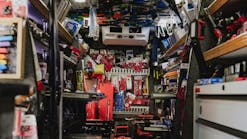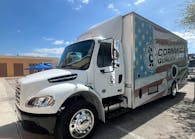There are two ways to win your customer’s pocketbook,” said a British salesman I know. “One is to ask for his wallet. The other is to ask for a few dollars at a time. I’ll take the second every time. There’s a lot less resistance.”
I think it sounds a lot funnier with his British accent.
By a “few dollars at a time,” he means making a series of smaller sales and earning a customer’s trust vs. trying to make one big killing. Similarly, an MBA would say, regardless of the economy, the way to grow your business is to uncover “underserved niches” and “untapped profit centers” to create “incremental increases” in sales.
As an established mobile dealer, there’s no silver bullet to bolster sales. Once you have a solid base of customers, most business growth doesn’t happen from major changes, it usually happens from small changes — like getting customers to spend dollars with you that they usually spend elsewhere. Sound easy? It can be.
One of those “underserved niches” I suggest you consider is personal and safety gear. You know the kind of products I’m talking about: knives, gloves, safety glasses, work boots and things like that. Every tech buys some level of this stuff; it doesn’t matter if he’s a tire changer or drivability expert.
A non-scientific poll of PD readers recently asked, “Which product looks most promising for high sales?” Of the 100-plus responses, personal and safety gear ranked near the bottom of the list. I think this is because most people consider the category as small-ticket items. The misconception is that these sales aren’t valuable. They are.
Stop at your favorite restaurant to understand this point. It doesn’t matter if it’s a steakhouse or a burger joint; they all want to sell you sides and drinks. That’s because they realize these small add-on sales can make a big difference in the bottom line.
And not all personal gear sales are nickel-and-dime deals. Consider work boots.
“Our boots run between about $70 and $150 a pair,” said Bruce Pontner, Coastal Boot president. He added that his 40-percent margins are more generous than many get for selling hardlines.
“I’ve had dealers tell me they’re putting a kid through college on what they make selling our shoes,” Pontner said.
Now there’s an underserved niche worth pursuing! Many dealers say they sell work boots. But having a bunch of flyers in a drawer that you hand out when someone asks isn’t really “selling.” Getting 10 techs a week to try on a pair of work boots is selling.
I decided to talk to some distributors who sell work boots to get their insights.
“When someone asks me if I sell work boots, I pull up my pant leg,” said Bob Flynn, a Mac Tools distributor from Austin, Texas. “I tell them ‘I not only sell them, I live them.’ ”
“I think our best salespeople are our customers,” said Pontner. “Our boots are made to be worn 12 hours a day … they’re insulated … they have orthotic insoles … Once a dealer puts on a pair, they can’t help but talk them up.”
“I couldn’t in good faith sell something I haven’t tried,” said independent dealer Jeff Cothren of Decatur, Ala., who also wears the boots he sells every day. “I’ve sold work boots since I started in this business in ’99.”
Some of the dealers I talked to only have a few shoes on hand to show the style and the construction. But Flynn swears by having a sizable inventory.
“I use myself as an example,” he said. “If I want a shoe, I wouldn’t want to wait for someone to ship it to me.” Flynn stocks about a dozen pairs of the most popular shoes on his truck, in the most common sizes (9-13). When he sells one pair, he orders a replacement.
“If a guy had to special order a shoe from me, he’s not going to buy from me. He’s just going to ask the next truck if he has it in stock.” Flynn said in his area many other mobile dealers carry a small inventory of work boots on their trucks, too.
Cothren doesn’t carry an extensive inventory like Flynn. But he points out another benefit of selling work boots. Eventually, they wear out. And once a customer has bought boots from you, they’re likely to keep buying boots from you.
“I’ve got some guys who order a new pair every six months,” said Cothren. “These are good boots, so you don’t need to. But some guys just like the feel of a new shoe.”
Along with a reoccurring revenue stream, there are also “add-on sales.”
“When a guy buys a pair of shoes from me, I give him a pair of NRA socks,” said Flynn. But there’s a purpose to his generosity.
“They always come back for more socks,” he said.
Everyone I talked to said sizing was rarely a problem since most adults know their shoe size. Although today’s work boot features a myriad of technological advances in construction, linings, insulation, and even the laces, it’s not a technical sell. Just by holding a work boot in his hand, the average customer can feel the quality of the construction. That’s usually enough to sell him.
Want to tap untapped sales — try being more aggressive with your personal gear items. They can offer a good margin and repeat business. There are still many techs that don’t buy their boots from their mobile dealer — yet.
Phil Sasso is president of Sasso Marketing Inc. (www.sassomarketing.com), a technical marketing agency specializing in tools and equipment. Subscribe to his free marketing tip at philsasso.com/blog

